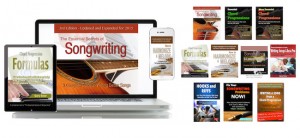Once you’ve defined “good”, it becomes easier to assess your own music.
“ The Essential Secrets of Songwriting” 10-eBook Bundle (plus a FREE copy of “Creative Chord Progressions”) is written by Gary Ewer, designed to straighten out your technique and get you writing better songs.
The Essential Secrets of Songwriting” 10-eBook Bundle (plus a FREE copy of “Creative Chord Progressions”) is written by Gary Ewer, designed to straighten out your technique and get you writing better songs.
 It can be a very educational experience for songwriters to spend time looking through Rolling Stone’s “500 Greatest Songs of All Time.” You can disagree with the list, of course, and many do, some criticizing its primarily American-Anglo focus for example. But it’s difficult to argue that the songs that make up the list haven’t been strong and influential. Most of them have helped to define their time.
It can be a very educational experience for songwriters to spend time looking through Rolling Stone’s “500 Greatest Songs of All Time.” You can disagree with the list, of course, and many do, some criticizing its primarily American-Anglo focus for example. But it’s difficult to argue that the songs that make up the list haven’t been strong and influential. Most of them have helped to define their time.
The top 10, for example:
- Bob Dylan: Like a Rolling Stone
- The Rolling Stones: Satisfaction)
- John Lennon: Imagine
- Marvin Gaye: What’s Going On
- Aretha Franklin: Respect
- The Beach Boys: Good Vibrations
- Chuck Berry: Johnny B. Goode
- The Beatles: Hey Jude
- Nirvana: Smells Like Teen Spirit
- Ray Charles: What’d I Say (Parts 1 And 2)
Mostly 60s music, and the entire list of 500 has almost no representation from the 2000s. But that will take time. Figuring out what’s “good” may be easy, but then figuring out what songs have been most influential — that takes a while to discern.
As a list of great songs, they are incredibly diverse, and that gets me to what this post is about. Figuring out why good songs are good starts by defining “good.” One way to do it is to look for the songs that have made the most sales, but hopefully you know already that that is a poor way to define musical quality.
For most songwriters, and indeed creators of any piece of art in any art form, “good” usually means most, if not all, of the following:
- It communicates an important message. (It makes people want to listen.)
- It balances narrative and emotional ways of communicating that message. (It taps into various listener mindsets.)
- The music is a strong partnership of lyrics, melody, chords, rhythm and overall production. (It sounds good.)
- It makes people want to listen again. (It’s attractive on a structural level, satisfying our emotional and artistic needs as listeners.)
So here’s a good exercise for songwriters. Go to the list, and click to a random song. Play it (Youtube or some other streaming service if you don’t own it), and then answer a simple question: What part of this song do you think makes the strongest connection to the average listener?
Answering that question is important, because you’re going to need to answer that same question when recording your own music. For every song it will be a different answer (though you may be surprised how often it’s the lyric that makes a song stand out.)
Answering that question for your own music takes a certain amount of skill with regard to objective listening. It’s hard to listen to your own music as if someone else wrote it. And it’s certainly hard to listen to your own music simply as a listener: a consumer of music.
But if you can’t do that, then whatever success you ultimately have as a songwriter is going to be random hit-or-miss.
So try it: play a recording of your own song, and ask yourself which part makes the strongest connection to listeners. And answer honestly: Why are your songs good?
______________
Written by Gary Ewer. Follow on Twitter.
“The Essential Secrets of Songwriting” 10-eBook Bundle looks at songwriting from every angle, and has been used by thousands of songwriters. How to use chords, write melodies, and craft winning lyrics. (And you’ll receive a FREE copy of “Creative Chord Progressions“)










